- Home
- Susan Beth Pfeffer
Shade of the Moon ls-4 Page 7
Shade of the Moon ls-4 Read online
Page 7
“If I had the money, I’d give it to you,” he mumbled.
“Thanks, Jon,” Alex said. “But we’ll need more than money. There’s paperwork to be filled out, and we have to be approved.”
“You will be,” Miranda said. “Your record is perfect, darling. Carlos was a Marine, and now he’s a guard. You’re just the kind of people who should own a truck. They’ll have to give you the permit.”
“Unless some claver’s fat-ass brother-in-law wants one,” Alex said. “Then it’s ‘Wait your turn, grub.’”
Jon had never heard Alex speak that way before. It didn’t seem to shock Miranda, though.
Instead she patted Alex’s arm. “You’ll get your truck,” she said. “And we’ll make a good life for ourselves. And for little Mulrooney.”
Alex stopped and gave her a hug. “Daniel,” he said. “Daniel Mulrooney Morales.”
Miranda laughed. “See, Jon?” she said. “Alex pretends to be such a tough guy, but I’ve got him wrapped around my little finger.”
Alex kissed her little finger. Jon felt jealous. He would never love a girl the way Alex loved Miranda. That was the price he’d pay for what he did to Julie.
They walked most of the way in silence, except for Alex’s occasional coughing. They slowed down a couple of times so Miranda could catch her breath. It was hard on Jon, too. He was used to running around in fetid air, but this time there was no oxygen tank to cleanse his lungs with.
The baby will never survive, he thought. Alex might not either, the way he was coughing. And what would that do to Miranda?
She seemed to read his thoughts. “You’re not used to this,” she said. “But after a while you don’t notice. We’re really very lucky, Jon. We have each other and Mom, and we know Matt and Syl and Carlos and Gabe are all right. And we have a future. I tell the baby that every day. Things are going to get better. Alex will get his truck, and we’ll find a safer, healthier place to live.”
Alex laughed, but there was no humor in it. “Miranda pictures the world as some great big enclave,” he said. “Room enough for everybody.”
“Maybe not tomorrow,” she said. “Or a year from now or even five years from now. I know everything that’s happened can’t be changed. But look at Jon. See how healthy he is, how strong. That’s how our baby is going to be. Gabe started out in much worse conditions, and he’s doing wonderfully. It can happen. We’ll make it happen.”
“Or die trying,” Alex said. “Or die not trying.”
“Don’t,” Miranda said. “Alex, please. Jon’s here, and we’re going to a dinner party.” She managed a small laugh. “Mom and her parties,” she said. “She spent all of yesterday cleaning and shopping. I’ve never seen the apartment look so good.”
“It helped take her mind off of things,” Alex said. “So what’s this Sarah like, Jon? How long has she lived in Sexton?”
They spent the rest of the walk talking about Sarah, Lisa, school, soccer. Jon felt much better about things—until he got to Mom’s apartment and saw her sitting at the kitchen table having an animated discussion with Sarah and her father.
It made perfect sense that they would have gotten there before him. The clinic was only a few blocks away, while he had the commute and the three-mile walk. But Jon had imagined himself there when Sarah arrived, to reassure her that she shouldn’t be uncomfortable, that soon she’d be back in Sexton where she belonged.
Sarah didn’t look remotely uncomfortable. She and her father rose when Jon, Miranda, and Alex entered the room. Jon could see the resemblance right away. Sarah and her father shared the same sandy hair and inquisitive green eyes. Introductions were made, hands were shaken, and before Jon knew it, Mom was fussing at the stove while continuing her conversation.
“Wine?” Alex asked, seeing the bottle on the table.
“My contribution,” Dr. Goldman said. “I brought a red and a white, since I didn’t know what dinner would be. Laura’s agreed to keep the unopened bottle for next time.”
“White with chicken,” Mom said. “Isn’t it amazing the things you remember?”
Clavers didn’t have to pay for their groceries, so Jon could only guess how much the chicken had cost. He saw Alex and Miranda exchanging glances, and Alex shrugging. Dinner for six, Jon thought. Who knew when Mom would eat next?
“I borrowed the table settings from our downstairs neighbors,” Mom said as she began serving the chicken and vegetables. “The apartment came with service for four. White meat or dark, Jeffrey?”
“White,” Dr. Goldman said.
Jon couldn’t get over the fact that Mom was already on a first-name basis with Sarah’s father. Or that Sarah was chatting with Miranda like they were old friends.
“We kept all our old china when we moved to Sexton,” Sarah said. “Daddy insisted. I have no idea why.”
“It was your grandmother’s,” Dr. Goldman replied. “And very important to your mother.” He took a bite of chicken. “You know, we never used the good china back home. My wife didn’t want to risk putting it in the dishwasher. But now, with the domestics washing the dishes, that’s not an issue. Sometimes I feel like we’ve gone from the twenty-first century back to the nineteenth.”
“The nineteenth wasn’t that great,” Alex said, helping himself to a slice of potato bread. “Child labor. No universal suffrage.”
“No indoor plumbing,” Miranda said. “I’ll take our twenty-first century with all its problems as long as I have a bathroom.” She laughed. “Oh, Mom. Alex’s agreed to Daniel. Daniel Mulrooney Morales.”
“It’s a girl,” Mom said. “I just know it. My first granddaughter.”
“It is kind of nineteenth century not to know if it’s a boy or a girl by now,” Miranda declared.
“I can’t wait to have babies,” Sarah said. “Dozens and dozens of them.”
“You can wait,” her father said. “High school, then med school, and then babies. As many as you want.”
“I’d like to have more than one,” Miranda said. “Maybe because there were three of us growing up.”
“I was one of four,” Alex said. “Let’s see how we do with one before we start adding on.”
“It’s natural for girls to want to have children now,” Mom said. “Like the baby boom after World War Two. Offering life, after so much death.”
“But the 1950s were a time of prosperity,” Alex pointed out. “Now we don’t know one day to the next if there’ll be enough food to survive.”
“Stop it,” Miranda said, putting her hands on her belly as though to keep her baby protected. “Jon, do you remember when Dad and Lisa came to visit? She was pregnant with Gabe, and we got to talking about the future, how bad things might be, and she walked away from the table? She couldn’t bear to listen.” She shook her head. “I didn’t understand. I didn’t understand anything in those days. But now I know just how she felt. My baby, Daniel or Liana, is going to live in a better world. I won’t hear otherwise.”
“You’re right,” Dr. Goldman said. “We can’t accept that things will always be bad. If we do, we won’t fight to make things better.”
“I’m sorry,” Alex said. “But that’s easy for you to say. You have your family china and the domestics to wash them. You have college for your daughter. You’ll be driven home in a private car to a house with clean air. Sure, you’d like things to get better. But we dream of what you have now. And we know we’ll never have it.”
“I know we’re spoiled,” Sarah said. “Jon and me and everyone in Sexton. But I really think we’d give up some of what we have so everyone could live better. Wouldn’t you, Jon? Eat a little less so your family could eat more?”
“You’re putting Jon on the spot,” Dr. Goldman said. “What’s he supposed to say, no, he won’t? And even if he would give up some of his food, how would his family get it? We’re not there yet, Sarah. We’re not at a point where we can make those kinds of sacrifices work.”
“You’re right,” Alex said. “Rig
ht now all the sacrifices go one way.”
“Alex,” Miranda said sharply. “Dr. Goldman, I’m sorry. Alex is tired. He hasn’t had a day off in weeks.”
“It’s not slave labor,” Alex said with a grin. “Just making as much money as we can before the baby’s born.”
“You’re working too hard,” Mom said. “Take Sunday off.”
Alex shook his head. “They tip better on Sundays,” he replied. “I’ll take a few days off when Carlos comes.”
“Daddy works too hard,” Sarah said. “He’d be at the clinic on Saturdays if I’d let him.”
“One doctor for all of White Birch,” her father said. “I’d clone myself if I could.”
“They’re doing a lot with cloning,” Jon said. “Plants mostly, but chickens and goats, too. The animals we need to survive.”
“I wish they’d clone cows,” Mom said. “I really miss hamburgers.”
Everyone laughed.
“You miss the strangest things,” Alex said. “I miss the smell of a bodega. My uncle owned one. I never liked going there, but now I think about all the different smells, the fruits, the spices, even the beer and the cigarettes.”
Miranda nodded. “I miss my high school cafeteria,” she said. “If you’d told me four years ago I’d ever be nostalgic for the cafeteria, I would’ve said you’re crazy. But we were so alive in there. So much drama, so much laughing.”
“I will never ever miss the Sexton cafeteria,” Sarah said so solemnly that everyone burst out laughing. “All right. It’s not the worst place in the world. It only feels that way. What do you miss most, Jon?”
“Baseball,” Jon said, without even thinking about it.
“Well, that’s flattering,” Miranda said. “You miss baseball more than your family?”
“Jon has his family,” Mom said. “Right here.”
“I thought you might say Julie,” Alex said. “The two of you were pretty close.”
I don’t miss Julie, Jon thought. She haunts me. But all he said was, “I think about her a lot. But if you start listing all the people you miss, you’ll never stop.”
“Speaking of missing, we’re going to miss the car they’re sending us,” Dr. Goldman said, standing up. “Come on, kids. We need to get going.”
“I hope you’ll come again,” Mom said. “And not just for the wine.”
“I’d like to,” Dr. Goldman said. “I haven’t enjoyed myself so much in a long time. Alex, Miranda, hang in there. Better times are ahead.”
Jon hugged Mom and Miranda. He’d be riding back with Sarah and her father in a chauffeured car, back to Sexton, to school, to vitamin supplements and purified air, chicken twice a week, and domestics to do all the cleaning. Back to the life Julie had given him in exchange for her own.
“Your mother’s wonderful,” Sarah said as they sat in the car, driving out of White Birch. “I like Alex, too. I wish he and Miranda could have what we have.”
“Someday they will,” her father said. “As long as you and Jon and all the young people work toward it.”
“We will,” Sarah said. “Jon promised me we would.”
Jon nodded in the darkness. It was easier to agree than to tell the truth. They’d never give up what they had. Sarah was the only person he knew who thought grubs were entitled to a better life. And for all her talking, Jon didn’t think she’d trade places with anyone in White Birch. She liked her purified air and vitamin supplements as much as the rest of them.
“Someday,” he said because he knew Sarah wanted to hear it. And what difference did another lie make? He was living a life of them. That’s why Julie haunted him day and night.
Chapter 6
Tuesday, June 2
“Who’s Julie?” Sarah asked first thing that morning.
Jon wasn’t surprised. He knew Sarah would be asking. You promise her to solve the world’s problems, and she still wasn’t going to be satisfied.
“Alex’s sister,” he replied.
“Is that how Miranda met Alex?” Sarah asked. “You knew his sister?”
“No,” Jon said. “It’s complicated.”
“I’m listening,” Sarah said, and Jon knew she was. Whether he wanted her to or not.
“We lived in Pennsylvania,” he said. “Well, you know that. Dad and Lisa had tried to make it west, but they couldn’t, so they came back. Gabe was a baby. They met people on the road, this really nice guy named Charlie, and Alex and Julie. They all came east, to our house.”
“And you and Julie became close?” Sarah said.
“Everyone paired off,” Jon replied. “Matt had married Syl a few weeks before, and Dad was with Lisa. Miranda didn’t give Alex a chance to say no. Even Mom hung out with Charlie. So it felt natural, Julie and me. She was just a year younger. I liked her a lot.” He paused at the memory. “Maybe I loved her. I said I did. I was almost fifteen. Can you be in love that young?”
“We didn’t have a chance to be young,” Sarah said.
“No,” Jon said. “We didn’t.”
“So you loved Julie,” Sarah said. “What happened to her, Jon?”
There was more than one answer to that question, but Jon knew what he would never tell Sarah, never tell anyone.
“Dad and Lisa and Alex and Julie and Charlie moved into an empty house,” Jon said. “I was there all the time, or Julie was at our place. Mom and Dad got along, and Mom was fixated on making sure Lisa had enough to eat so she could nurse Gabe.”
Sarah nodded. “I can picture that,” she said. “And Miranda and Alex falling in love.”
“The town we lived in was still getting food,” Jon said. “Every Monday you could go in and get a few bags. So Julie and I went together. On our way back…”
This was hard. It didn’t seem to matter that he’d rehearsed what to say, how to say it. The words didn’t want to come out.
Sarah touched him gently on his arm. “It’s okay,” she said.
It wasn’t okay. It would never be okay. “There was a tornado,” Jon said flatly. “We got caught in it. I tried to hold on to Julie, but the wind picked her up. Remember plastic bags, how the wind could make them dance? It was like that. Julie fell wrong. I don’t know. She broke her neck or her spine. She was paralyzed. She was conscious, but she couldn’t move.”
“Oh, Jon,” Sarah said.
“We took her back to our house,” Jon continued. “Dad and Matt and me. Alex got lost in the storm. It took him a couple of days to get back to the house.” He forced himself not to think of Alex.
“Did Julie die?” Sarah asked softly.
“Not right away,” Jon said. “She lived another day or so, and then she died in her sleep. Miranda was with her. Julie couldn’t do anything for herself. Someone had to be with her all the time. Everyone took turns.”
“That must have been horrible for you,” Sarah said. “Staying with her, seeing her lying there, helpless.”
“I never saw her,” Jon said. “The house Dad and Lisa were living in collapsed in the storm. Lisa and Gabe and Charlie were stuck in the cellar. Then Charlie died, so it was just Lisa and Gabe. We had to pull all the rubble off the cellar roof before it collapsed on them. That was all we did, pull the rubble away. I didn’t see Julie. I worked on saving Lisa and Gabe.”
“That had to be done,” Sarah said. “You did what had to be done.”
“No,” Jon said. “I mean, yes, we had to get Lisa and Gabe out. But that wasn’t why I didn’t sit with Julie. I was scared to. I’m a coward, Sarah. Deep down, that’s all I am. A coward. I told Julie I loved her, but when she was helpless and dying and her brother was missing, I couldn’t make myself see her. Lisa was an excuse. Mom and Matt and Miranda were used to treating me like a baby. They probably felt they were protecting me by not making me say good-bye to Julie. And I let them. I let Julie die without seeing me.”
“Jon,” Sarah said, and he could see how much she wanted to comfort him.
“No,” he said. “You know why I’m here today, w
hy I’m walking to the bus with you? I took Julie’s pass. Alex had three. He gave two to Lisa, for her and Gabe. Julie was supposed to live with them. Lisa loved Julie like a daughter. Only Julie died, and everyone said I should use the last one. Because I was the youngest, and they were all in the habit of protecting me. I’m here on Julie’s pass. I couldn’t even face her when she was dying, and I get to live here and eat the food and go to school, and Miranda’s going to have Alex’s baby in that hovel.”
“Jon, the apartment isn’t that bad,” Sarah said. “And Miranda and Alex won’t live there forever. You loved Julie?”
Jon nodded.
“Did she love you?”
He nodded.
“Then she’d want you to have her pass,” Sarah said. “She’d want you to have the chance she couldn’t have.”
“That’s what everyone told me,” Jon said. “So I wouldn’t feel bad about living in Sexton while they were stuck in White Birch.”
Sarah stood on her tiptoes and kissed Jon on his cheek. “I’m sorry Julie died,” she said. “I’m sorry for Alex and for you and Lisa. But I’m glad you’re here. You’re my lifeline, Jon. I need you so much.”
You don’t know me, Jon thought. Nobody does.
The only one who had was Julie. And she wasn’t around to tell everyone who Jon really was.
Thursday, June 4
Dr. Carlyle had been a professor of political science at Baumann Christian College, previously located twenty miles east of White Birch. The college, like most of the colleges in America, had ceased to exist four years ago. Dr. Carlyle, like the rest of the teachers, was not a claver, and so he kept his home in White Birch and was now forced to commute to Sexton, like a grub, to teach civics to the claver teenagers.
Jon understood why so much of the school time was devoted to the sciences—botany and biology, chemistry, even physics. He understood the math they were taught was practical, intended for engineering. If you were lucky enough to be a Sexton teenager, it was presumed you’d go to Sexton University and learn all that you could to further their agriculture. New and better greenhouses needed to be built, water supplies to be expanded, and better sources of electrical power to be designed.

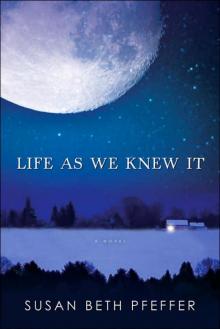 Last Survivors 01 - Life as We Knew It
Last Survivors 01 - Life as We Knew It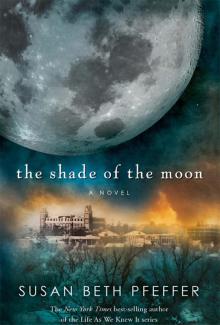 Last Survivors 04: Shade of the Moon
Last Survivors 04: Shade of the Moon Thea at Sixteen
Thea at Sixteen Kid Power
Kid Power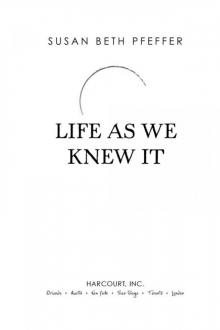 Life as We Knew It
Life as We Knew It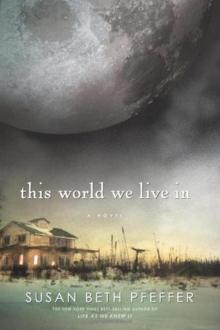 This World We Live In
This World We Live In Meg at Sixteen
Meg at Sixteen Blood Wounds
Blood Wounds The Beauty Queen
The Beauty Queen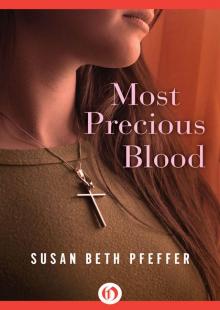 Most Precious Blood
Most Precious Blood The Dead and the Gone
The Dead and the Gone Sybil at Sixteen
Sybil at Sixteen Evvie at Sixteen
Evvie at Sixteen Getting Even
Getting Even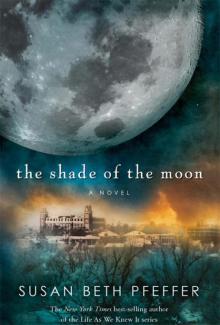 Shade of the Moon ls-4
Shade of the Moon ls-4 The Dead and Gone
The Dead and Gone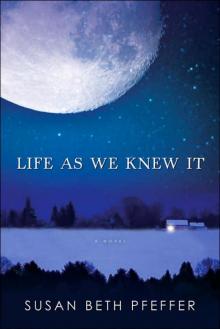 Life As We Knew It lawki-1
Life As We Knew It lawki-1 Fantasy Summer
Fantasy Summer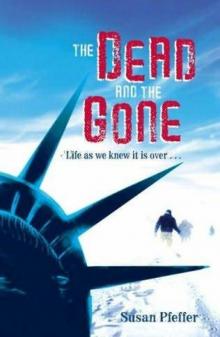 The Dead and the Gone ls-2
The Dead and the Gone ls-2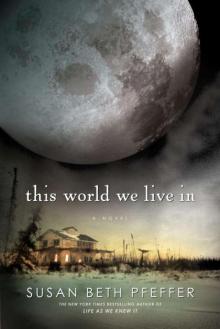 This World We Live In ls-3
This World We Live In ls-3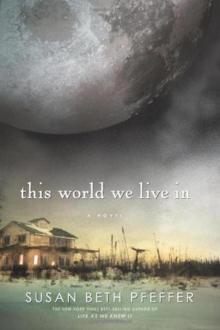 This World We Live In (The Last Survivors, Book 3)
This World We Live In (The Last Survivors, Book 3)